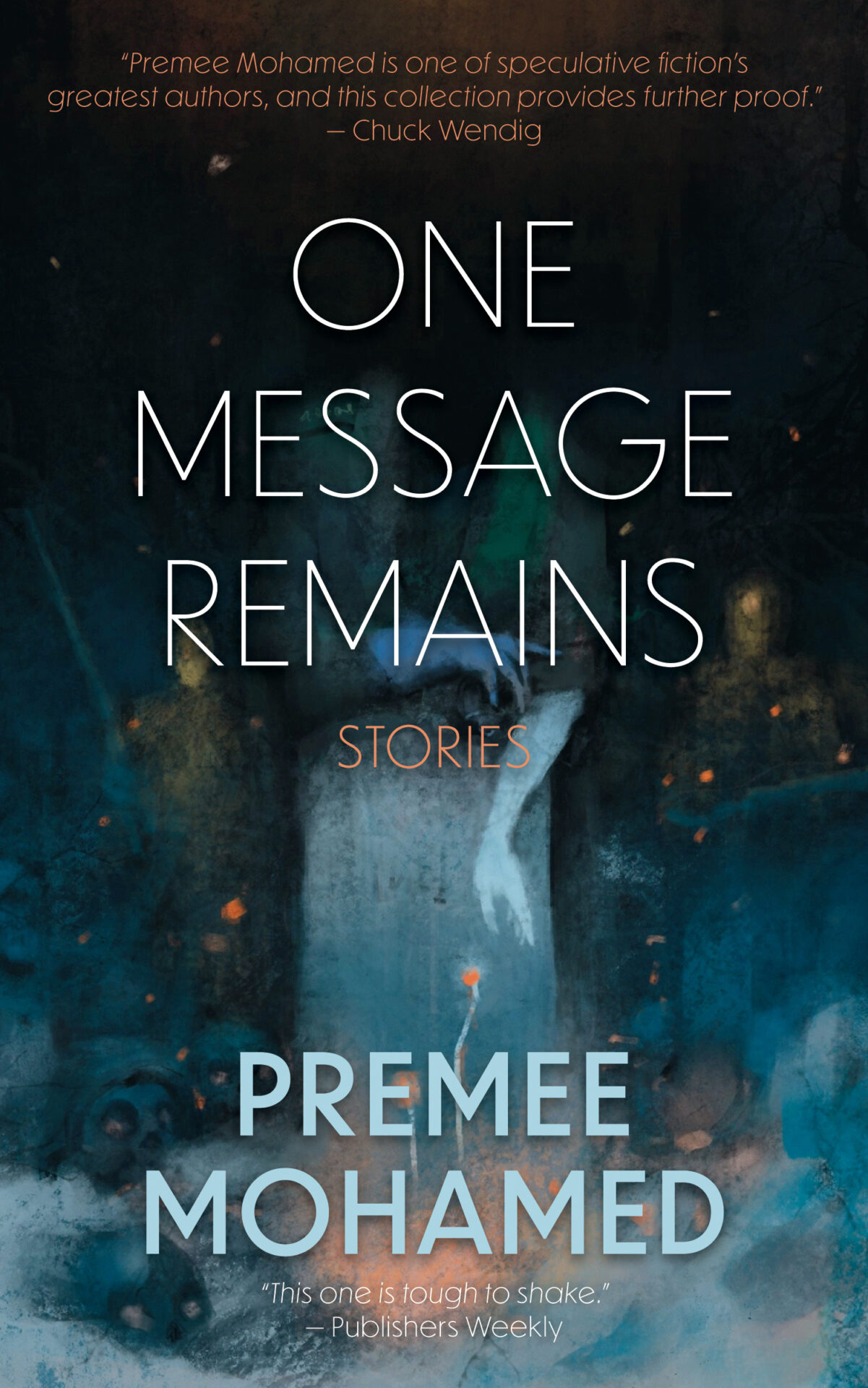
Premee Mohamed is joining us today to talk about her collection of short stories, One Message Remains. Here’s the publisher’s description:
Pageantry, pomp, pretense, and peril—”The General’s Turn,” originally published in The Deadlands, drew readers into the dark world of a ceremony where Death herself might choose to join the audience… or step onto the stage.
Award-winning author Premee Mohamed presents three brand new stories set in this morally ambiguous world of war and magic. In “One Message Remains,” Major Lyell Tzajos leads his team on a charity mission through the post-armistice world of East Seudast, exhuming the bones and souls of dead foes for repatriation. But the buried fighters may have one more fight left in them—and they have chosen their weapons well.
In “The Weight of What is Hollow,” Taya is the latest apprentice of a long-honored tradition: building the bone-gallows for prisoners of war. But her very first commission will pit her skills against both her family and her oppressor.
Finally, in “Forsaking All Others,” ex-soldier Rostyn must travel the little-known ways by night to avoid his pursuers, for desertion is punishable by death. As he flees to the hoped-for sanctuary of his grandmother’s village, he is joined by a fellow deserter—and, it seems, the truth of a myth older than the land itself.
What’s Premee’s favorite bit?

I never had a grandmother.
Well, that’s not fair. Technically, I had two: my paternal one died before I was born and my maternal one, who I had only spoken to a few times, died when I was about ten. She visited Canada once, so there’s a single photo of her looking pretty Done With Everything (frankly after raising ten kids I would be too) with an infant me on her lap, and that’s about it.
So I didn’t grow up with easy access to what I imagined a grandmother-grandchild relationship would look like. (This was mostly based on children’s media.) I quietly pined for either a frail old lady who would bake cookies and coach me through breakups, or a spitfire granarchist who would chain herself to railings while yelling about reproductive rights. I craved the wisdom of an elder, and friendship with someone just a tiny bit distant from my everyday life.
Of course, kidlit flattens everything. Grandmothers don’t exist as one of a binary category any more than anyone else, and the mere passage of time doesn’t erase your identity. And once I finally grew up and realized that, I wondered how I could render my grandmother-hunger into interesting, varied, narratively distinct older women on the page.
Zelsa Rostyn—referred to as Nana—is my favourite bit of my collection ONE MESSAGE REMAINS. She appears in the novelette FORSAKING ALL OTHERS, narrating in first person, while the ‘main’ character, her deserter grandson, is in close third. I thought about keeping the entire story in third, but Nana’s voice interested me, and I wanted to give her an opportunity to speak.
First person can be a tricky beast, and yet as I found last year in my writer-in-residence position, it’s also the chosen point of view for nearly every first-time author. It’s often not a case of ‘write what you know,’ but of finding a character so absorbing that the writer instinctively uses ‘I.’ In most of the samples I read, the character’s ‘voice’ sounded indistinguishable from the author’s. “That’ll change with time,” I told people if they found themselves frustrated by it. “You just need to let the characters go, let them be themselves.”
Nana’s voice comes from a very different place than my own. I’m a lifelong singleton urbanite with no kids and zero experience living through conflict; Nana married a couple of times, gave birth to kids, took others in during the war, worked on a farm, and unofficially fought in multiple wars. And yet her voice came to me instantly, intuitively, every anecdote, every detail, every gesture she would have made while telling it to her grandson and his new friend.
You can live off thirty sheep but let me tell you, you’re still not going to be sleeping on feather-beds or buying shoes for all the kids. As soon as the frost is gone you’re out there plowing. All weathers, as soon as you can walk, you’re out there beating the bounds, picking odds and ends for the pot, pitching stones at the stray dogs… A boring, miserable life, made just bearable by the knowledge that everybody lived like that, all of us, everybody.
Nana doesn’t repeat things out of absentmindedness; she says what she means and she emphasizes what needs emphasis. She doesn’t filter how she feels or felt or how she sees the world or how she views other people; we get to hear about her uncle (“A nice man, but a know-nothing”), we see the whole scene the first time she meets Death, and she informs us—forcibly—that she’s well aware of our doubts. We’re not fooling her.
Yes, go on and blink. Go on. I don’t care. Addled old woman, you think. No. I remember everything.
What I loved best about writing Nana was the journey she’s taken to arrive where she is when the story opens. In the other stories, we see a common theme of being tasked with something that you feel is relatively reasonable, if not laudable—repatriating enemy remains as an act of charity; complying with an ancient tradition of the officer class; continuing your family’s rare, generations-long trade—and then coming to an epiphany about it. If not what you’ve been asked to do directly (build a machine that kills, for example) then about your particular role in empire, in colony, in war, society, the huge invisible structures that expect us to pay for our inclusion with service.
In each story, there is a turning point where someone realizes that what they’re doing is morally unconscionable, and it generally happens on the page, so that the rest of the narrative is about the aftermath of the choice. For Nana, that happened decades ago—discovering enmity and picking a side to support. Now, she has the benefit not only of her naturally adamantine nature but years and years of experience and knowledge. How to resist. How to fight. How to stand against figures of authority; how to teach others to do so; how to shelter people, change minds, and evade capture.
We starved. People died. But that didn’t matter to them. That was the first time I saw it, saw that it didn’t matter, and I thought… We throw around the word enemy far too easily. We do. And we let people tell us what it means. When we should decide for ourselves.
Nana is a hero who would never call herself a hero, and she’s probably right to do so in a book so ambiguously about heroism and villainy. But she’s one of my favourite creations no matter what she calls herself, and I hope people love her as much as I do.
LINKS:
BIO:
Premee Mohamed is a Nebula, World Fantasy, and Aurora award-winning Indo-Caribbean scientist and speculative fiction author based in Edmonton, Alberta. She has also been a finalist numerous other awards, including the Hugo, Ignyte, Locus, British Fantasy, Ursula K. Le Guin, and Crawford. In 2024 she was the Edmonton Public Library official writer-in-residence. She is the author of the Beneath the Rising series of novels, as well as several novellas. Her short fiction has appeared in many venues and she can be found on her website at www.premeemohamed.com.
